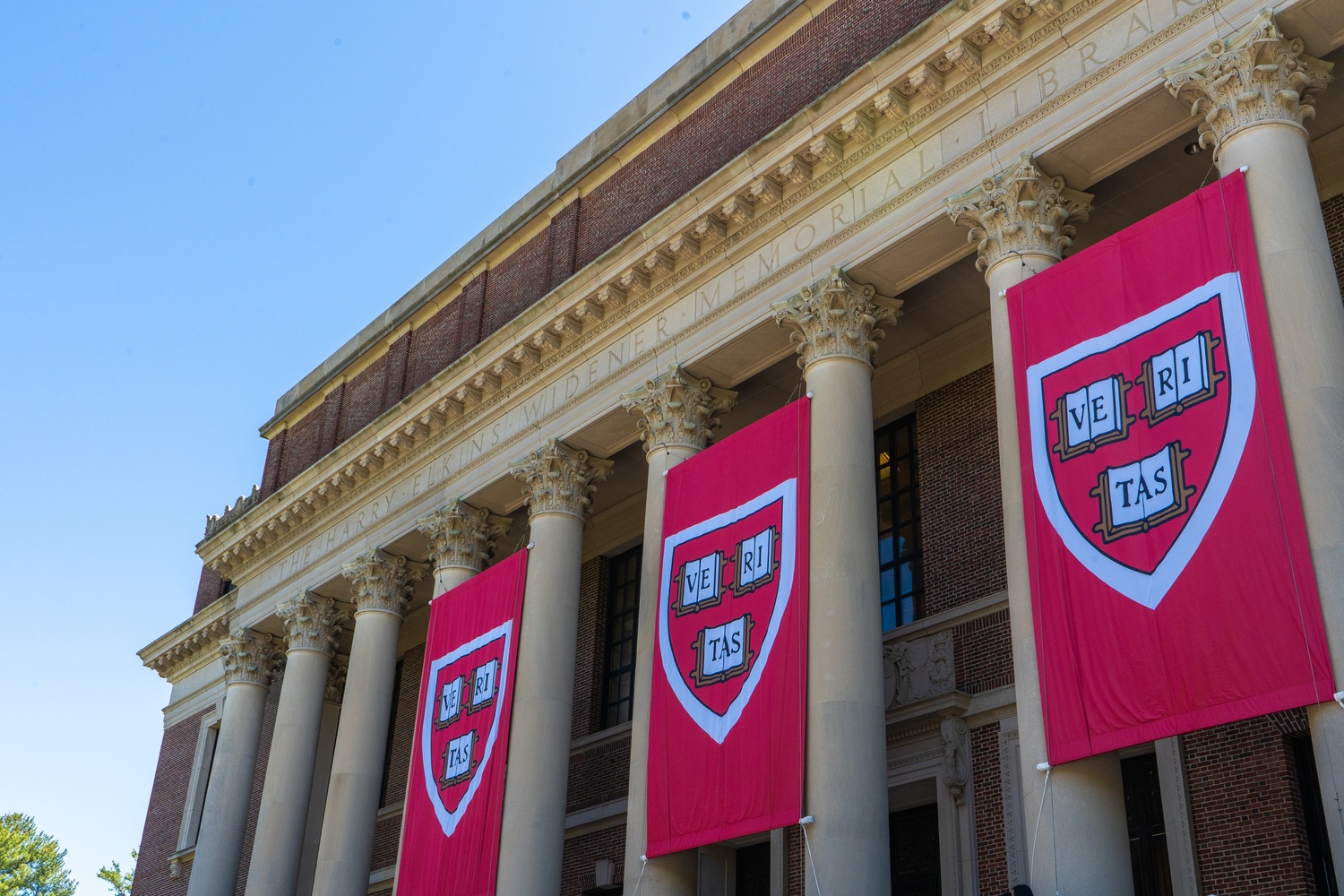
News
Summers Will Not Finish Semester of Teaching as Harvard Investigates Epstein Ties

News
Harvard College Students Report Favoring Divestment from Israel in HUA Survey

News
‘He Should Resign’: Harvard Undergrads Take Hard Line Against Summers Over Epstein Scandal

News
Harvard To Launch New Investigation Into Epstein’s Ties to Summers, Other University Affiliates

News
Harvard Students To Vote on Divestment From Israel in Inaugural HUA Election Survey
What Makes Harvard Great
What makes Harvard great is its people — and we are under assault.
Federal agencies have frozen billions of dollars of federal funding, floated revoking our tax-exempt status, threatened student visas, and now trumpeted an outright ban on Harvard’s enrolling international students.
The Trump administration has declared war on higher education. Harvard has become its biggest battleground.
On April 14, University President Alan M. Garber ’76 drew a line: “The University will not surrender its independence or relinquish its constitutional rights.” That statement — the strongest yet from a University leader — energized our community and made Harvard a global symbol of resistance to Trump.
One could feel this defiant pride at Commencement last week, when thousands in Tercentenary Theater gave Garber a standing ovation. As longtime Harvard affiliates going back nearly four decades, we were among those standing. The only way to defeat the bullies is to fight back.
But the larger story is more complicated.
The same forces behind January 6th, book bans, anti-LGBTQ legislation, attacks on immigrants, and rollbacks on abortion rights and race-based affirmative action are driving the assault on higher education. Their real target is multicultural democracy and human freedom. These ongoing attacks on civil rights and critical thinking are part of a larger political and cultural backlash fueled by an unrelenting obsession with all things “DEI.”
We see the negative impacts of this here at Harvard. For several years, Harvard has proudly supported a growing number of student-centered events intentionally designed to complement the larger Commencement calendar by creating time and space to honor graduates from communities that have not always been welcome here. Far from segregating our community, these joyous, technicolor, University-wide gatherings celebrate our unapologetically global 21st-century Harvard.
In February, the U.S. Department of Education ordered colleges to purge “race-based decision-making.” In the face of this shameless political gaslighting and extortion, Harvard decided to pull funding, space, and staff support from the affinity graduations honoring Arab, Black, Latinx, first-gen, LGBTQ, Jewish, veteran, and disabled graduates. It also changed the name of the Office of Equity, Diversity, Inclusion and Belonging to “Community and Campus Life.”
As faculty who have been centrally involved in fostering inclusion at Harvard, we were as stunned as our increasingly diverse alumni community by these tragically opaque decisions. Who was consulted? What problem did this decision solve? Is the defunding of these celebrations temporary or permanent? Strategy or submission? And what’s next?
In the absence of such information, we can only assume that these were not easy decisions — and we do not blame our friends and colleagues across this institution who are caught in the crosshairs of this vicious culture war. But understanding the complex constraints of our current crisis does not soften the blow of betrayal or make it any easier to be collateral damage. “One Harvard” will never be true or indivisible so long as any of us are treated as if we are dispensable.
At this perilous moment in history, Harvard must reaffirm its commitment to all its people without compromising any of its principles. “DEI” is not the empty acronym of conservative cultural caricature or the bureaucratic brainchild of renegade “wokeness.” Diversity, equity, and inclusion are values forged in historic struggles for justice that provide the strongest foundations we have for our loftiest aspirations. They are moral commitments that require resilient action.
A commitment to diversity means embracing difference and rejecting division. A commitment to equity means distributing resources fairly to help repair the worst effects of historical hoarding of wealth, power, and privilege. A commitment to inclusion means making space for everyone by building bridges and dismantling barriers between different kinds of people.
These are the values and actions that are required for multicultural democracy to work and for human freedom to flourish. The Trump administration’s assaults are not centrally about programs, policies, or protocols, though these are among the casualties. At their core, these assaults are meant to marginalize and muzzle the very people who make this country great, precisely because we have fought for so long to make this country better.
If Harvard abandons any of its people in this fight, it will lose this war.
Years ago, the late, great African American poet and LGBTQ activist Audre Lorde wrote “your silence will not protect you.” This simple and profound truth gives us a roadmap for times like these. Silence has never protected us, and yet silence lies all around us here at Harvard. We must break this silence, take up space, and speak our truth.
That is why we were so thrilled to see so many affinity celebrations take place this year, despite our University’s retreat and betrayal. Students organized them, alumni raised funds for them, faculty spoke at them, staff supported them, and neighbors offered space for them. This was creative, collective, cross-generational work that represents the very best of our campus and community life.
Harvard should celebrate the courage and commitment it takes to hold these celebrations, especially this year. It should also celebrate all of us. After all, we too are Harvard.
Evelynn M. Hammonds is the Barbara Gutmann Rosenkrantz Professor of the History of Science, Professor of African and African American Studies, and former Dean of Harvard College. Timothy Patrick McCarthy ’93 is Lecturer on Education and Public Policy and Faculty Chair of the Global LGBTQI+ Human Rights Program at the Carr-Ryan Center. They delivered the faculty keynote addresses at the 2025 Lavender Celebration.
Want to keep up with breaking news? Subscribe to our email newsletter.

